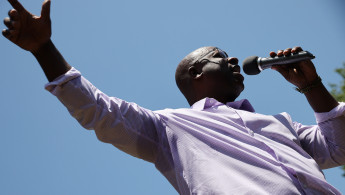With Bowman's NY primary defeat, the squad sees its first loss
The expected loss of Jamaal Bowman in Tuesday's Democratic primary is the first loss for a member of the progressive "squad", and with that a major loss for Palestinian voices in US Congress. What does this mean for the future?
In an institution where there is heavy pressure to conform to longstanding norms, Bowman found a home in the "squad" of young progressives, who, through working together, have been able to bring to the forefront issues such as organised labour, accessible healthcare, and human rights in US foreign policy, most controversially of Palestinians.
Though Bowman's fellow squad member have been able to build their brands — including their voter turnouts — on these issues (though not without challenges), Bowman struggled after his district's map was redrawn to include vast swaths of wealthy suburbs.
His district's remapping would make him one of the most vulnerable candidates in Congress for a primary challenge, leading to the most expensive House race in US history, with more than US$20 million in campaign spending.
Leading the big donors were the American Israel Public Affairs Committee through its super PAC the United Democracy Project; and Fairshake, a PAC backed by Silicon Valley executives linked to the cryptocurrency industry.
In the last election, Bowman survived his primary in part due to a split vote of his moderate Democratic opponents. This time, he had one strong opponent, Westchester County Executive George Latimer, who was able to consolidate the moderate Democratic vote.
Latimer dominated the early vote, with some towns voting 10-1 in favour of him against Bowman. The race was called before 10 pm, earlier than most close primaries, showing Latimer's solid victory of over 55 percent.
It's unclear when or if Bowman realised he didn't have a path forward in the race. What is clear is that in the last months before the election he became increasingly outspoken about his concerns over unconditional US military support for Israel as well as major spending in US elections by AIPAC, two issues he saw as inextricably linked.
In May, Bowman voted with Representative Rashida Tlaib of Michigan on a resolution recognising the Palestinian Nakba, or catastrophe, that forced hundreds of thousands from their homes with the establishment of Israel; in a campaign rally in the Bronx over the weekend, he accused Latimer of supporting genocide, referring to Israel's war in Gaza, which has killed more than 38,000 Palestinians since October; and he has repeatedly referred to AIPAC as being led by Republican megadonors.
Does Bowman's primary loss on Tuesday mean a more emboldened mega-donor class, as some progressives say they fear could happen? Or has his outspokenness opened the floodgates for more open criticism of big money in politics?
"I've seen this sometimes. Maybe Bowman, by the end of the race, saw that he didn't have a path, and he said: Let's go out swinging. Let's not sugar coat it," J. Miles Coleman, associate editor of Sabato's Crystal Ball at the University of Virginia Center for Politics, told The New Arab.
"He's still going to be in office for the rest of the year," he said. "We'll see if he becomes even more outspoken."




 Follow the Middle East's top stories in English at The New Arab on Google News
Follow the Middle East's top stories in English at The New Arab on Google News


![A group of Palestinians, foreign and Israeli activists gather to participated in an olive picking event on the land in the town of Battir, which is under threat of confiscation by Israel in Bethlehem, occupied West Bank on 8 November 2024. [Getty]](/sites/default/files/styles/image_330x185/public/2182930803.jpeg?h=199d8c1f&itok=__0LgGsa)